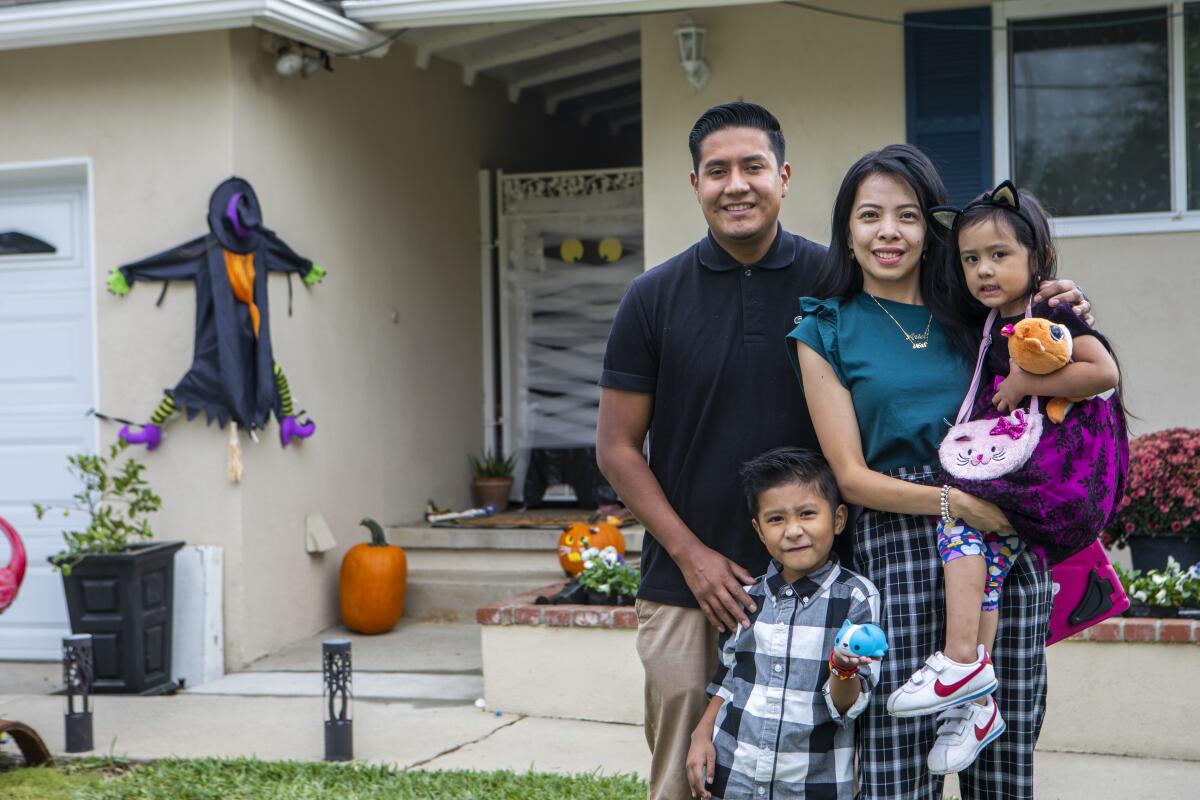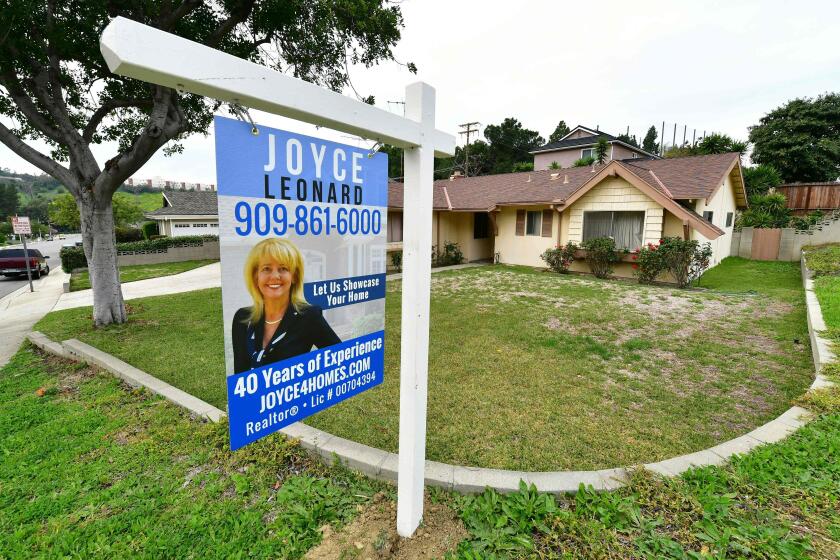Zillow just gave up on ibuying. What’s the deal with the algorithmic home sales?

- Share via
Last spring, Duarte residents Marsha and Todd Johnson decided they were ready to exit the California dream.
They wanted to cash in on the meteoric rise in the value of their home and start retirement as they long planned, in Washington state, to be near family and the beach. But the couple, in their 50s and 60s, didn’t want prospective buyers traipsing through their house in the middle of a pandemic and dreaded the hassle of making repairs and managing offers, even with the assistance of a real estate agent.
So instead, they tapped an algorithm for help: On the website of a San Francisco company named Opendoor they filled out some “basic paperwork” and then completed a 15-minute video inspection through a smartphone. A few days later, a firm offer came through, and they sold their home to Opendoor.
“The process was pretty pain-free,” said Marsha Johnson, who worked for Los Angeles County social services before moving out of state. “We got the money pretty quick.”
A new way of selling homes is taking root on laptops and smartphones across the country.
Companies including Opendoor, Offerpad and Redfin are using algorithms backed by reams of data to value houses and buy them fast, in cash, and with much of the transaction online. The companies then do minor repairs and resell the homes, earning money on price appreciation and fees they charge.
Operating somewhat as industrial-scale flippers, the so-called ibuyers — instant buyers — have expanded rapidly in recent years, primed for growth by a worldwide flood of capital chasing yield in the U.S. housing market.
People can also buy homes directly from the companies, touring houses at their leisure by downloading a smartphone app to unlock the front door.
COVID-19 unleashed new demand for homes, made the well-off wealthier, and fueled extreme bidding wars. The result? The $1-million home is everywhere.
For those who have already endured the more traditional, time-consuming way, a quick and easy home transaction may seem too good to be true. Already, cracks are showing in the ibuying business model — still in its infancy — and industry experts aren’t sure how these new players are affecting the housing market more broadly.
“That’s what I find really interesting. What happens when you have a corporate middleman involved in the real estate transaction process?” said Mike DelPrete, an independent real estate analyst and scholar in residence at the University of Colorado in Boulder. “What happens when Wall Street and billions of dollars come in?”
The answer has significant bearing for the country but particularly for California, where home prices are among the highest in the nation, middle-class families have had increasing difficulty affording homes, and many renters are struggling to make ends meet.
In recent weeks, Zillow, the second-largest ibuyer, made a fast U-turn after ramping up its home-flipping — buying and reselling. The company initially said it was pausing purchases because it had run into labor and supply chain issues. On Tuesday, Zillow said it would exit the ibuying business altogether, raising questions about whether the tech powering these companies is up to the challenge in such an overheated, fast-changing housing market.
“Fundamentally, we have been unable to predict the future pricing of homes to a level of accuracy that makes this a safe business to be in,” Zillow Chief Executive Rich Barton said during a conference call with analysts. Zillow had been listing large numbers of homes at lower prices than it bought them at, and it announced a $381-million loss on the service, called Zillow Offers, in the third quarter.
Zillow’s exit shows ibuying is tough, but other ibuyers are still growing and their services are likely to become even more popular, said Rick Palacios Jr., research director at John Burns Real Estate Consulting.
Zillow is closing its tech-powered home-flipping operation, saying its pricing algorithms weren’t accurate enough to build a stable business.
Ibuyers say they simplify home sales, streamlining and speeding up the usual steps: repairs, viewings, negotiations. The companies promise an offer within days, even minutes, and purchase homes “as is” with cash, meaning sellers don’t need to make repairs or wonder whether their buyer’s financing will come through.
Sellers can also choose their own closing date, which makes moving easier. For those buying, Opendoor will even purchase a new house for consumers in cash, then later work to lock in mortgage financing.
In Southern California, the largest ibuyers — Opendoor, Zillow, Offerpad and Redfin — accounted for 1.2% of total home sales in Los Angeles and Orange counties during the second quarter and 2% in the Inland Empire — an increase from the same period in 2018, when the figure was 0.1% in the two metro areas, according to a recent report from Zillow.
In some markets, such as Phoenix, ibuyer market share is above 5%.
“I would be shocked if this isn’t an option for people to sell or buy a home,” Palacios said. “It is going to be a part of housing going forward.”
A major question is how the companies affect home prices and whether they can deliver, at large scale, the seamless experience they advertise.
In a viral TikTok video in September, a Las Vegas real estate agent posed one “hypothetical” scenario as ibuying becomes more popular. In it, a “company everyone knows” and uses to search for homes purposely pays $40,000 more for a house than what it’s been buying homes for, with the goal of setting a higher comparable sale so it could sell the other houses at a higher price.
As the theory of market manipulation ping-ponged around the internet, Zillow and Redfin both came forward to deny it was happening or would even make financial sense.
Some analysts said they believe ibuyers have put upward pressure on prices in a different way. Part of that is simple supply and demand, because the companies represent additional buyers in a crowded marketplace with too few homes for sale.
DelPrete, the real estate analyst, said there’s also evidence ibuyers grew more aggressive as the market kicked into overdrive this year.
An analysis he conducted of home sales from April through June showed Opendoor, Zillow and Offerpad paid a few percent more than the valuations provided by an algorithm from ATTOM Data Solutions. That’s a shift from 2019 and 2020, when the companies paid less than the ATTOM valuation.
In a hot market in the second quarter, DelPrete said, buyers overall paid about 103% to 104% of the ATTOM valuation. That’s about what Zillow and Offerpad paid; Opendoor clocked in higher, at 107.7% of the ATTOM valuation.
Ibuyers may have boosted offers during the second quarter because investors want to see them grow market share, DelPrete said, and to do that in a hot market the companies need to pay top dollar.
“You have publicly listed companies that need to show growth, and they have billions of dollars of Wall Street capital,” he said. “They are going to go out there and pay whatever they need to pay to acquire homes.”
Tomasz Piskorski, a real estate finance professor at Columbia Business School, said he doubts the companies put much upward pressure on prices given their still small overall market share. Rather, the main drivers of today’s double-digit price appreciation are still low interest rates, low inventory, people seeking more space while working from home and a large cohort of millennials entering peak home-buying years.
Some ibuyers have also noted that they resell the homes they purchase and argue that the easy-to-use process brings more supply to the market than otherwise would exist.
Piskorski also doubted that ibuyers would purposely overpay. But he did say investor pressure and a belief that prices will keep rising might cause ibuyers to take more risks in what they buy, including, for example, inadvertently buying homes with problems that should really be valued lower.
“You could make the legit case that as long as house prices on average are growing, even if we are willing to make more mistakes, the mistakes on average will be compensated by the growth in house prices,” he said.
The Southern California housing market is hot, but cooling. Home prices rose nearly 13% in September — the smallest jump since January.
Such a strategy still requires an accurate prediction of future home prices.
After a red-hot market in the first half of the year, both Opendoor and Offerpad adjusted faster than Zillow to a housing market in which price appreciation had slowed, DelPrete said.
According to his analysis of the Phoenix market, both Opendoor and Offerpad reduced the prices they paid for homes in September, as well as the number of homes they bought. Zillow kept buying more homes and paying more for them.
By October, Zillow was listing homes in Phoenix for 6.2% less than what it paid, while Opendoor listings were priced 1% above what it paid, DelPrete said.
“If you pay too much for a home that’s not good,” Offerpad Chief Executive Brian Bair said. “That’s where you get tripped up.”
If ibuying continues to grow market share, there’s still a question of what happens in a sustained downturn.
Palacios said home prices could fall faster if ibuyers suddenly stopped buying or if they kept buying but did so at discounts as consumers rushed to the exits.
Ibuyers could also sell to families at a discount or choose to unload homes en masse to single-family rental firms. The companies already sell some homes to big landlords; according to a report from Bloomberg, Zillow is now shopping roughly 7,000 homes to institutional investors.
For now the focus of individual home sellers isn’t the future but their pocketbooks.
In interviews with The Times, more than half a dozen people who sold their house to Opendoor said they did so because they liked the speed of the transaction and the certainty of an offer they found fair. All said they had a positive experience with the largest of the ibuyers, including Marsha Johnson, the Duarte home seller.

On the flip side, those who bought homes from Opendoor didn’t always have stellar reviews — including Hazel Aguayo, who bought the Johnsons’ former home from Opendoor in July.
Aguayo, a 36-year-old part-time real estate agent, said she and her husband, Ruben, sought to move from a rented apartment because they wanted a yard for their two children, 5-year-old Noah and 4-year-old Ariel.
But if Aguayo hadn’t represented herself in the transaction, she said, she thinks another agent would have urged her to look elsewhere. Aguayo said the point person Opendoor assigned to her transaction often didn’t respond to questions, forcing her to call a general phone number and constantly update different employees where she was in the buying process.
The escrow company Opendoor used was also hard to get in touch with and at one point told her to wire an incorrect amount, Aguayo said. “Doing [a sale] with Opendoor is like doing it with customer service.”
Three other Opendoor buyers or their representatives recounted similar experiences to The Times.
Aguayo identified an aspect of buying through the company that played to her advantage: Opendoor employees she came into contact with weren’t in Southern California. That enabled her to successfully negotiate her family’s purchase to about $37,000 below the list price by pointing to other houses listed for sale in a less attractive part of Duarte.
“Had the agent been local, they would know not to compare this house from those, because this house is in the best neighborhood,” Aguayo said.
- Share via
Watch L.A. Times Today at 7 p.m. on Spectrum News 1 on Channel 1 or live stream on the Spectrum News App. Palos Verdes Peninsula and Orange County viewers can watch on Cox Systems on channel 99.
More to Read
Inside the business of entertainment
The Wide Shot brings you news, analysis and insights on everything from streaming wars to production — and what it all means for the future.
You may occasionally receive promotional content from the Los Angeles Times.















